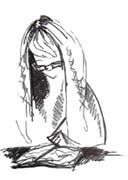 Something tells me I'm in over my head, here. What, review the "spiritual journeys" of the incredible Nikos Kazantzakis, with only my wits, my feeble understanding of the book and a four-year degree to help me? Bah. But I'll give it my best shot:
Something tells me I'm in over my head, here. What, review the "spiritual journeys" of the incredible Nikos Kazantzakis, with only my wits, my feeble understanding of the book and a four-year degree to help me? Bah. But I'll give it my best shot:This is the closest to an autobiography that Nikos Kazantzakis gets, and it starts out beautifully, at the close of his life, with a preface by his wife Helen that begins: Nikos Kazantzakis asked his God for ten additional years in which to complete his work--to say what he had to say and "empty himself." He wanted death to come and take only a sackful of bones. Ten years were enough, or so he thought.
That should tell you something of the fierce passion that consumed Kazantzakis, a passion that is evident in his every word--in every book of his I've read (The Last Temptation of Christ, The Greek Passion and the first half of Zorba the Greek), but particularly this one, he presents characters so wracked with anguish, so driven to suffer and find God, that it's almost necessary to set the book down every few paragraphs and take a deep breath. All souls are bared, and GRECO is all the more intense because it is Kazantzakis whose spirit is offered up for the reader.
GRECO is not a strict autobiography--Kazantzakis makes no bones about that--and so it does not necessarily chronicle his experiences. Instead, GRECO follows Kazantzakis throughout his life as his understanding of God evolves, through his experiences, through the people he meets, through his work, and his particular road to God takes a fascinating course.
High points? The best chapter, in my opinion, is "Massacre", near the beginning of the book, when Kazantzakis encounters his "first" massacre as a boy--after this chapter, his father, who had until then been a gruff and inaccessible character to me, earned a whole lot of my respect, in a way that caught me completely off guard. Some of my other favorite chapters were the ones telling of Kazantzakis' pilgrimages to monasteries all over the continent, though his studies are not limited to Christianity: in his travels he encounters not only the Greek Orthodox church, but also Nietszche, atheism, Communism, Greek patriotism, Buddhism--his is an unslakable thirst, and the conclusions he comes to are awesome.
Which is to say nothing of the writing. Every sentence I read, I wanted to mull over individually, pronouncing each word outloud, they were all so lovely--but it took me long enough to read the book as it was, so I stuck to silent reading. His descriptions are gorgeous enough to rival those of Nabokov (and that's saying a lot, you know) and the scenes in Crete were my absolute favorites--lemon blossoms and lusty women, and so on.
In closing, I give you the best opening paragraph I've read in a long, very long, time:
I collect my tools: sight, smell, touch, taste, hearing, intellect. Night has fallen, the day's work is done. I return like a mole to my home, the ground. Not because I am tired and cannot work. I am not tired. But the sun has set.RATING: 4

No comments:
Post a Comment